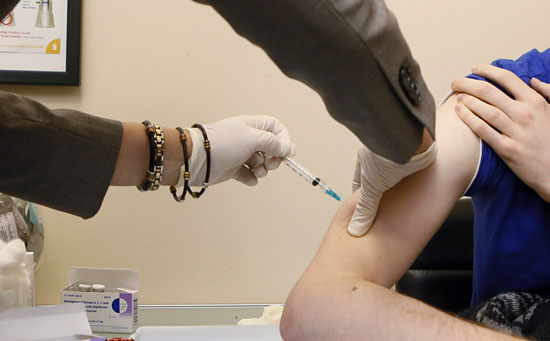3 dead in possible meningitis cluster
April 2, 2014

A possible cluster of meningitis cases has health officials urging vaccinations for those at high risk.
Three people have died and five others have fallen ill from meningitis in Los Angeles County since the beginning of 2014, and patterns in the cases have prompted public health officials to urge vaccinations for HIV positive men and those deemed to be at higher risk for contracting the disease.
Public health officials investigating the eight cases said that four of them involve men who had sex with other men. All three of the dead fall into that category; two of them were HIV positive and one was not.
Among the four cases in the possible cluster involving men who had sex with other men, other potential links include the fact that three of the men lived or socialized in West Hollywood or North Hollywood. The ages of the three who died are also similar—27 or 28, while the fourth, who survived, is 50.
A meningitis outbreak in New York last year prompted the health department there to urge men who had regular intimate contact with other men to be vaccinated against the disease. But Los Angeles County public health officials at the time said that was not necessary here, given a lack of connections between the 2013 cases it investigated.
This year, however, common factors among the cases are prompting a different recommendation from the Los Angeles County Department of Public Health, which consulted with the California Department of Public Health and the Centers for Disease Control and Prevention before issuing its alert.
“The facts are different,” said Dr. Jonathan E. Fielding, the county’s director of public health. “We didn’t have the same commonalities then as we do now.”
Although the risk is “very low for the general population,” county officials said that HIV positive men, as well as those who have close or intimate contact with multiple partners, find sex partners online, or share cigarettes and drugs, are at higher risk for the disease and should visit their health care provider to receive the vaccine. Those at high risk who don’t have insurance can get a free vaccination at a county facility.
The Los Angeles cases are all attributed to the strain of meningitis known as invasive meningococcal disease. It is a “sporadic and uncommon bacterial infection of the blood or the lining of the brain and spinal cord that can affect the entire body,” the Department of Public Health said a news release. “The infection can cause brain damage, hearing loss, and even death.”
It is not spread by casual contact, such as being in the same room with someone who is infected, and is less infectious than the flu. The bacteria responsible for the disease are spread by “very close exposure to sneezing and coughing or direct contact with saliva or nose mucus,” the public health statement said.
Meningitis can be treated with antibiotics but because it progresses quickly, “immediate diagnosis and treatment is imperative,” according to the news release. Symptoms include high fever, stiff neck and “altered mental status.”
Under CDC guidelines in place since 2005, all pre-teens and adolescents should receive the meningitis vaccine. A first injection is given at 10 to 12 years old, followed by a booster shot five years later in order to offer protection when the disease is most common, between the ages of 16 and 21. In addition, people who live in close quarters such as dormitories and jails are also considered high risk and advised to get vaccinated as a matter of course.
Still, Fielding said, even those who have been previously vaccinated should get another shot now if they fall into one of the current high risk groups, and if their vaccination was given more than five years ago.
Posted 4/2/14












 405 bridge work causes a stink
405 bridge work causes a stink
